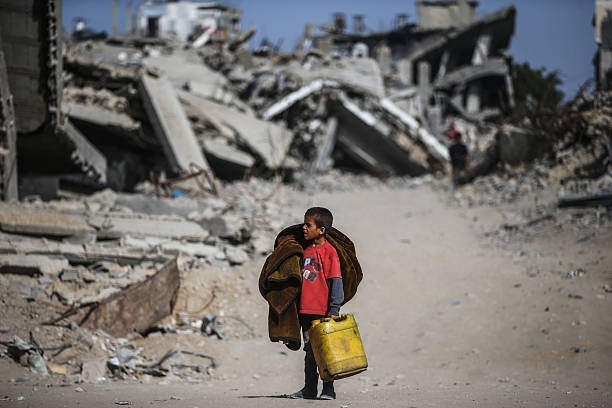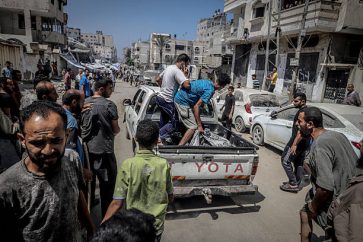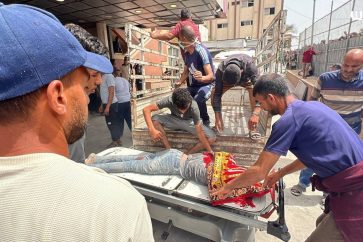The Gaza Municipality has warned of an imminent and total collapse of the city’s water and sewage systems due to dwindling fuel supplies and the Israeli targeting of vital infrastructure. The crisis threatens to trigger a phase of “mass thirst” and a widespread health and environmental catastrophe affecting hundreds of thousands of Palestinians.
Breaking | Thousands of Palestinians struggle to obtain bread in Al-Nuseirat camp, central Gaza Strip, amid the entry of limited humanitarian aid. pic.twitter.com/vcSDmI757w
— Quds News Network (@QudsNen) May 24, 2025
“We are on the brink of a mass thirst crisis,” warned Gaza Municipality spokesperson Husni Mehanna. “The situation could spiral out of control at any moment.”
Hundreds of Palestinian families have been forced to flee to Gaza City’s seashore where basic services, particularly water, are nonexistent. The massive destruction of infrastructure in southwestern parts of the city has left these areas virtually uninhabitable.
The crisis has forced residents to dig hundreds of random cesspits for sewage disposal, creating a serious threat of groundwater contamination and disease spread. Officials fear that water shortages in displacement areas will dramatically worsen the already severe humanitarian situation, especially as famine spreads throughout the region.
“We are facing a complete collapse of essential services,” Mehanna stated. “This threatens to escalate the environmental and humanitarian catastrophe due to dwindling fuel supplies and Israel’s deliberate targeting of vital infrastructure.”
The joy of a child after receiving a bundle of bread, following more than two months of deprivation — a joy beyond measure, even though the bundle is only enough for his family for one day, amid real fears that he may not be able to get it again due to the limited supplies… pic.twitter.com/0wXC84o5zm
— Eye on Palestine (@EyeonPalestine) May 23, 2025
The municipality estimates that hundreds of thousands of residents and displaced people sheltering in central and western Gaza City are at serious risk. With temperatures rising and displaced populations packed into small areas, the potential shutdown of sewage treatment plants due to fuel shortages could lead to wastewater flooding residential neighborhoods.
Since October 7, 2023, the ongoing Israeli aggression has severely damaged the Gaza Strip’s water infrastructure. According to previous data from the Gaza government, more than 115,000 meters of water networks have been damaged, 63 wells have gone out of service, 4 major water tanks have been destroyed, and the only desalination plant in the northwest of Gaza City—which used to produce about 10,000 cubic meters of water daily—has shut down.
Mehanna concluded by saying that Gaza Municipality urgently needs around $16 million to restart water and sanitation facilities and save the population from a crisis that could escalate into an unprecedented humanitarian disaster.
The Gaza Strip has been facing a catastrophic humanitarian and relief crisis since ‘Israel’ shut down all crossings on March 2, blocking the entry of food, medicine, aid, and fuel, while intensifying its genocidal campaign against the Palestinian population of the Strip.
Hala (10 years old) and Abdullah (12 years old), displaced from Fash Farsh in Rafah, rely daily on food kitchens in Khan Yunis to secure meals due to the shortage of flour and bread, facing difficult conditions especially as Hala’s sister is visually impaired and in need of… pic.twitter.com/4xvNXg70Sg
— Eye on Palestine (@EyeonPalestine) May 23, 2025
With full US support, ‘Israel’ has been committing acts of genocide in Gaza since October 7, 2023, resulting in over 175,000 Palestinians killed or injured, most of them women and children, and more than 11,000 missing, along with hundreds of thousands displaced.
‘Israel’ has maintained a blockade on the Gaza Strip for 18 years, and around 1.5 million Palestinians out of 2.4 million in the Strip are now homeless after their homes were destroyed in the genocidal war. The Strip is also suffering from severe famine due to Israel’s closure of crossings to humanitarian aid.
Source: Al-Manar English Website and Palestinian media




